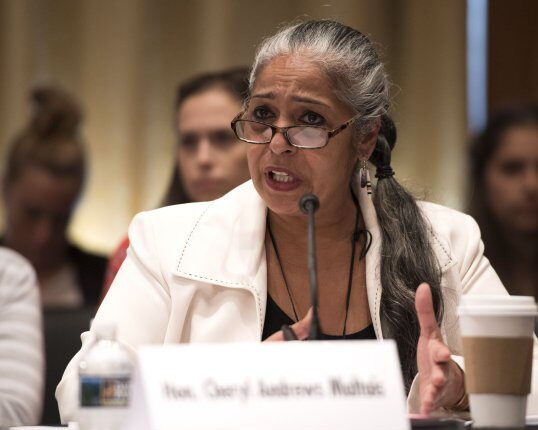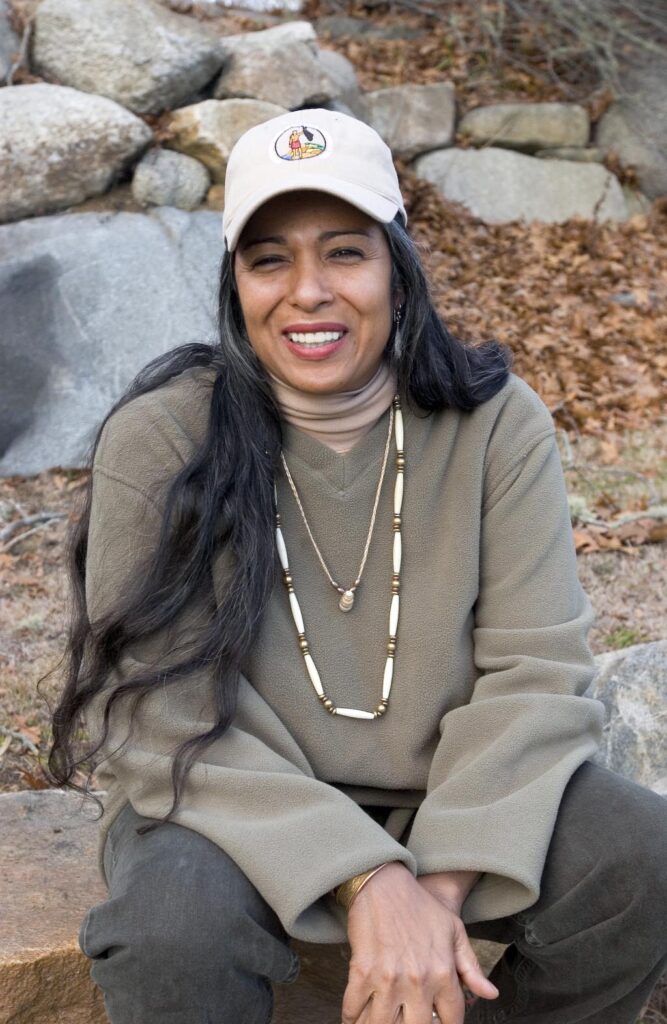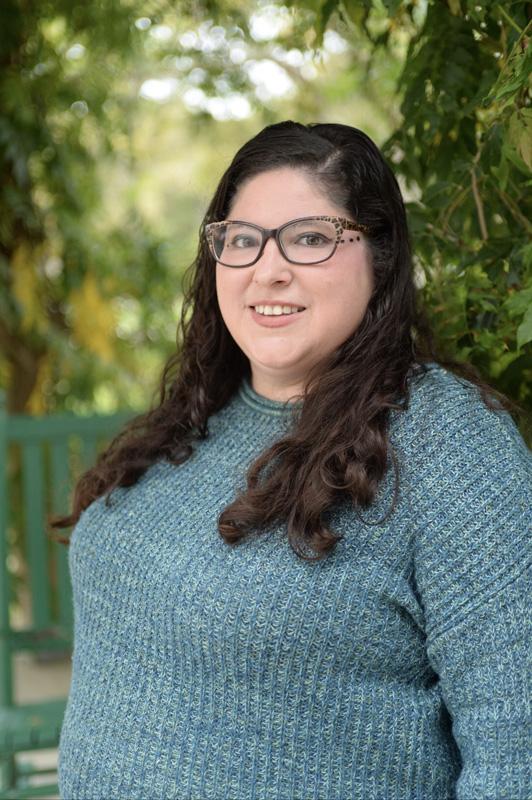In races that could have major implications for the Wampanoag Tribe of Gay Head (Aquinnah) and Martha’s Vineyard, a slate of political newcomers is looking to unseat a crowded field of longtime incumbents, including the tribal chairperson, in a pivotal upcoming tribal council election.
 Held annually during a general membership meeting in November, the Aquinnah Wampanoag tribal elections often include contested races for at-large seats on the seven-member tribal council or for tribal leadership positions that include chairperson, vice chairperson, secretary and treasurer.
Held annually during a general membership meeting in November, the Aquinnah Wampanoag tribal elections often include contested races for at-large seats on the seven-member tribal council or for tribal leadership positions that include chairperson, vice chairperson, secretary and treasurer.
But the 2022 tribal election has a uniquely packed field, with a slate of four newcomers running on a unified platform, challenging incumbents for the powerful tribal chairperson position, as well as three at-large tribal council seats.
Elections will be held on Sunday, Nov. 20, starting at noon at the Aquinnah Wampanoag Community Center. The election will have a hybrid format, with tribe members able to submit ballots both in-person or through the mail. Candidates said that mail-in ballots are expected to be sent out to tribal members shortly. The tribal elections are run independently of the upcoming federal midterm elections.
An online candidate forum open only to tribal members is being held on Sunday, Oct. 16 at noon. Tribal members will receive a link to the candidates forum via email.
The Wampanoag Tribe of Gay Head (Aquinnah) is one of two federally recognized American Indian tribes in Massachusetts, with recognition coming in 1987. According to tribal members interviewed for this story, there are between 1,300 and 1,400 registered tribal members, with about 400 living on Martha’s Vineyard, and about 100 living in approximately 30 homesteads on tribal lands in Aquinnah.
At the top of the ballot, two-term incumbent Cheryl Andrews-Maltais will face off against political newcomer NaDaizja Bolling for a three-year term as tribal chairperson. The tribal chairperson, among other duties, manages the day-to-day administrative operations of the tribe. It is a separate position from tribal chief, which is held by F. Ryan Malonson and is not an elected role.
Ms. Andrews-Maltais, who according to publicly available voting records was born in 1959 and lives in Edgartown, is seeking her third term as tribal chairperson and fifth term total, after serving as chairperson between 2008 and 2013. Ms. Andrews-Maltais, who was narrowly re-elected chairperson in 2019 after facing a write-in challenge, spearheaded the tribe’s pursuit of a class II gaming facility on tribal land in Aquinnah.

Tribal Chairperson Cheryl Andrews-Maltais is running for re-election.
— Provided
Between stints as tribal chairwoman, Ms. Andrews-Maltais completed a presidential appointment for the Obama administration as a senior advisor to the Assistant Secretary on Indian Affairs. She has also served as the tribe’s personnel director and historic preservation officer before her first term as chairman in 2008. Ms. Andrews-Maltais met with Vice President Kamala Harris during her recent trip to Martha’s Vineyard, and just this past week convened a roundtable with Secretary of the Interior Deb Haaland in Mystic, Conn.
In a phone interview with the Gazette, Ms. Andrews-Maltais pointed to her stewardship of tribal services during the pandemic and her cultivation of strong relationships with federal leaders as her primary accomplishments over the past three years.
“We’ve expanded our programs and services to reach more and more of our tribal members,” Ms. Andrews-Maltais said. “The pandemic was, really, creating full-fledged programs out of nothing with lightning speed. And credit to tribal council for trusting me with doing that.”
She said she had obtained $1.6 million dollars in federal earmarks to put toward tribal affordable housing, and $800,000 to conduct a tribal wastewater study. Ms. Andrews-Maltais also said that the tribe in April purchased land off-Island in New Bedford to develop a satellite campus, with the intent of providing a wide variety of social services to mainland tribal members.
“Everything that we do on the Island, we want to mirror off-Island,” Ms. Andrews-Maltais said. “We had been talking about having a satellite office for a long time, and we’re happy we’re able to do that.”
She said her years of working inside and outside federal government, as well as her fluency with running tribal operations, were essential to navigating the tangle of federal bureaucracy that the tribe is partially dependent upon for its operational budget.
 NaDaizja Bolling is the program director at the Aquinnah Cultural Center and is running for tribal chairperson.
NaDaizja Bolling is the program director at the Aquinnah Cultural Center and is running for tribal chairperson.
— Ray Ewing
“Running a tribal government is not simple. It’s very complex,” Ms. Andrews-Maltais said. “If you don’t have enough experience, [the federal government] will roll over you. So it’s that experience, and continuity that I bring to the table.”
But Ms. Andrews-Maltais is facing a unique challenge from a group of young female tribal members, who have organized a slate of candidates with a unified mission of improving transparency and tribal communications.
Ms. Bolling, 28, program director of the Aquinnah Cultural Center, a nonprofit community center and museum operated independently of the Wampanoag Tribe, is running for tribal chairperson. Other members of the slate include Kayla Manning-Darcy, who is running for tribal secretary, as well as Linda Coombs, Kristina Hook and Camille Madison, who are running for three at-large seats on tribal council.
In interviews, Ms. Bolling and Ms. Darcy said the slate, known as T8HKEESH (pronounced Tur-Keesh), means “Wake up,” and developed out of a desire to get tribal members more involved with their leadership and governance. Originally intending to put out an e-newsletter for tribal members, Ms. Bolling switched gears when she decided to run for chairperson, creating a website, www.t8hkeeshaquinnah.com, to outline the slate’s pillar values and providing biographical information on the candidates, who have been campaigning for a large portion of the past year. Both Ms. Bolling and Ms. Manning-Darcy said restoring their sense of tribal community and improving tribal communications and transparency were major factors in their decision to run for council on a unified platform.
“We have a movement that is happening,” Ms. Darcy said. “And all of the ladies that are running on our platform, we all share the same sentiment about what we want our tribe to be in, and what our tribe is missing. It’s the light at the end of the horizon. I see a revolution happening. It’s not to put down previous administrations, but it’s inspiring.”
The granddaughter of Matthew (Cully) Vanderhoop, Ms. Bolling grew up in Cambridge but spent summers with family on-Island, and said she was inspired to run for tribal chairperson after returning to the Island earlier this year for work and becoming more involved in tribal government.
“Having the opportunity to listen in, and really involve myself in the business of the tribe was quite the experience. I learned a lot. But it also opened up eyes to a lot of deficits that we have as a tribe,” Ms. Bolling said. “So I made the decision to leave my job in D.C., and come home to really commit myself to trying to start the process of repairing some of those things.”
Ms. Bolling cited issues like tribal divisions, an indifference toward climate change’s impacts on tribal lands and outdated communication as problems she hoped to address if elected tribal chairperson.
She also voiced concerns with the administrative arm of the tribe, saying it was understaffed and that tribal headquarters should be more publicly accessible.
“To sum it up, the administrative side of our tribe is not functioning properly,” Ms. Bolling said. “There’s just a shrinking sense of community. Those bonds have been weakened…and that’s been something that I’ve been focused on for the last couple of years, organizing to bring together the community whether they’re on the Island, or whether they’re off of the Island.”
Ms. Bolling is not opposed to the idea of the tribe pursuing its gaming rights. A proposed bingo hall stalled after the United States First Circuit Court of Appeals upheld a federal district court ruling that required that tribe to obtain state and local building permits before beginning construction. While Ms. Andrews-Maltais criticized the legal decision and said the gaming development was no longer a priority in the interview, Ms. Bollin took issue with the process that the tribe has used to pursue the proposed Aquinnah facility. Instead, she said the tribe should look toward other economic development engines, like helping local entrepreneurs on a small scale and promoting aquaculture and shellfishing.
“I was at a time supportive of us having a casino, and I still may be. But I think the way the process has taken form, I would abandon that,” Ms. Bolling said. “That’s nothing I see as a viable economic development opportunity for us.”
Approximately four acres of land remain vacant and fenced off near Black Brook and State roads in Aquinnah. The land was cleared in early 2019 to construct the facility, which was announced in 2019 as a 10,000 square foot “sprung” structure that would have about 200 games and be built in partnership with Global Gaming Solutions, the gaming arm of the Oklahoma-based Chickasaw Tribe. The partnership remains in place, Ms. Andrews-Maltais said.
“We are not separated. We are still engaged, and we are still in partnership with them,” Ms. Andrews-Maltais said.
Ms. Bolling also said she hoped to use her skills as an organizer and prior experience in communications roles to help patch divisions between on-Island and off-Island tribal members.
“Ultimately, we are Wampanoag people. We are tribal people. And the things that connect us are not just social services,” Ms. Bolling said. “It’s the sense of community. It’s the sense of place. It’s the connection to our language. And unless we are actively reaching those folks off-Island to bring them into that, we’re not doing what we should be as a nation. And that’s what’s been missed.”
In the race for a three-year term as tribal secretary, Ms. Manning-Darcy, 31, will face off against Nefititi Jette.
Ms. Manning-Darcy, who is the daughter of Aquinnah police sergeant Paul Manning, currently works as an assistant property manager for Island Elderly Housing, and lives in tribal housing in Aquinnah. Ms. Jette currently works as an administrative assistant for the historic preservation arm of the Wampanoag Tribe and has significant note-taking experience, according to Ms. Andrews-Maltais.
There are two at-large tribal council seats that are up for three-year terms. A third at-large tribal council seat is up for a two-year term. Leigh Vanderhoop is also running for one of the three available tribal council seats, rounding out the crowded field.
Ms. Andrews-Maltais endorsed her own slate of candidates in the interview, including Ms. Jette for secretary, and longtime incumbents Naomi Carney, Steven Craddock and Eleanor Hebert for tribal council seats, pointing to their experience.
“These roles and responsibilities are very, very important,” Ms. Andrews-Maltais said. “And you can’t parachute in.”
Tribal members must show their tribal enrollment identification to attend the meeting and vote in-person on Nov. 20. The vote is part of the tribe’s quarterly general membership meeting and is not open to the public. Tribal members looking to attend the general membership meeting virtually must pre-register by filling out a tribal attestation card and emailing it to gmreg@wampanoagtribe-nsn.gov.









